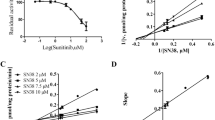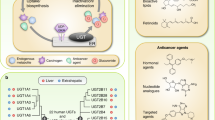Abstract
Drug combinations including irinotecan and gefitinib have been evaluated in clinical trials. SN-38 is the active metabolite of irinotecan, and the increase in its concentration due to drug interactions will result in increased clinical toxicity. We aimed to investigate the effects of gefitinib and its predominant metabolite observed in human plasma, O-desmethyl-gefitinib (DMG), on SN-38 glucuronidation. Our data indicated that both gefitinib and DMG are potent inhibitors of SN-38 glucuronidation via UGT1A1 inhibition. It is predicted from in vitro data that gefitinib administered at 700 mg/day may result in about 149 % increase in SN-38 AUC, but there is no significant effects on SN-38 AUC at lower concentrations. Our prediction study provides a basis for design of clinical studies for the development and optimization of this combination.



Similar content being viewed by others
References
Ando Y, Saka H, Asai G, Sugiura S, Shimokata K, Kamataki T (1998) UGT1A1 genotypes and glucuronidation of SN-38, the active metabolite of irinotecan. Ann Oncol 9:845–847
Bergman E, Forsell P, Persson EM, Knutson L, Dickinson P, Smith R, Swaisland H, Farmer MR, Cantarini MV, Lennernas H (2007) Pharmacokinetics of gefitinib in humans: the influence of gastrointestinal factors. Int J Pharm 341:134–142
Brennan RC, Furman W, Mao S, Wu J, Turner DC, Stewart CF, Santana V, McGregor LM (2014) Phase I dose escalation and pharmacokinetic study of oral gefitinib and irinotecan in children with refractory solid tumors. Cancer Chemother Pharmacol 74:1191–1198
Chau I, Cunningham D, Hickish T, Massey A, Higgins L, Osborne R, Botwood N, Swaisland A (2007) Gefitinib and irinotecan in patients with fluoropyrimidine-refractory, irinotecan-naive advanced colorectal cancer: a phase I–II study. Ann Oncol 18:730–737
Copeland RA (2000) Enzymes: A practical introduction to structure, mechanism, and data analysis. Wiley, New York
Cunningham D, Humblet Y, Siena S, Khayat D, Bleiberg H, Santoro A, Bets D, Mueser M, Harstrick A, Verslype C, Chau I, Van Cutsem E (2004) Cetuximab monotherapy and cetuximab plus irinotecan in irinotecan-refractory metastatic colorectal cancer. N Engl J Med 351:337–345
Fuchs CS, Moore MR, Harker G, Villa L, Rinaldi D, Hecht JR (2003) Phase III comparison of two irinotecan dosing regimens in second-line therapy of metastatic colorectal cancer. J Clin Oncol 21:807–814
Furman WL, McGregor LM, McCarville MB, Onciu M, Davidoff AM, Kovach S, Hawkins D, McPherson V, Houghton PJ, Billups CA, Wu J, Stewart CF, Santana VM (2012) A single-arm pilot phase II study of gefitinib and irinotecan in children with newly diagnosed high-risk neuroblastoma. Invest New Drugs 30:1660–1670
Furman WL, Navid F, Daw NC, McCarville MB, McGregor LM, Spunt SL, Rodriguez-Galindo C, Panetta JC, Crews KR, Wu J, Gajjar AJ, Houghton PJ, Santana VM, Stewart CF (2009) Tyrosine kinase inhibitor enhances the bioavailability of oral irinotecan in pediatric patients with refractory solid tumors. J Clin Oncol 27:4599–4604
Goff LW, Benson AB 3rd, LoRusso PM, Tan AR, Berlin JD, Denis LJ, Benner RJ, Yin D, Rothenberg ML (2012) Phase I study of oral irinotecan as a single-agent and given sequentially with capecitabine. Invest New Drugs 30:290–298
Gupta E, Lestingi TM, Mick R, Ramirez J, Vokes EE, Ratain MJ (1994) Metabolic fate of irinotecan in humans: correlation of glucuronidation with diarrhea. Cancer Res 54:3723–3725
Hanioka N, Ozawa S, Jinno H, Ando M, Saito Y, Sawada J (2001) Human liver UDP-glucuronosyltransferase isoforms involved in the glucuronidation of 7-ethyl-10-hydroxycamptothecin. Xenobiotica 31:687–699
Hartmann JT, Pintoffl JP, Kroning H, Bokemeyer C, Holtmann M, Hohler T (2008) Gefitinib in combination with oxaliplatin and 5-fluorouracil in irinotecan-refractory patients with colorectal cancer: a phase I study of the Arbeits gemeinschaft Internistische Onkologie (AIO). Onkologie 31:237–241
Hofheinz RD, Kubicka S, Wollert J, Arnold D, Hochhaus A (2006) Gefitinib in combination with 5-fluorouracil (5-FU)/folinic acid and irinotecan in patients with 5-FU/oxaliplatin- refractory colorectal cancer: a phase I/II study of the Arbeitsgemeinschaft fur Internistische Onkologie (AIO). Onkologie 29:563–567
Horiike A, Kudo K, Miyauchi E, Ohyanagi F, Kasahara K, Horai T, Nishio M (2011) Phase I study of irinotecan and gefitinib in patients with gefitinib treatment failure for non-small cell lung cancer. Br J Cancer 105:1131–1136
Innocenti F, Undevia SD, Iyer L, Chen PX, Das S, Kocherginsky M, Karrison T, Janisch L, Ramirez J, Rudin CM, Vokes EE, Ratain MJ (2004) Genetic variants in the UDP-glucuronosyltransferase 1A1 gene predict the risk of severe neutropenia of irinotecan. J Clin Oncol 22:1382–1388
Iyer L, Das S, Janisch L, Wen M, Ramirez J, Karrison T, Fleming GF, Vokes EE, Schilsky RL, Ratain MJ (2002) UGT1A1*28 polymorphism as a determinant of irinotecan disposition and toxicity. Pharmacogenomics J 2:43–47
Iyer L, Hall D, Das S, Mortell MA, Ramirez J, Kim S, Di Rienzo A, Ratain MJ (1999) Phenotype-genotype correlation of in vitro SN-38 (active metabolite of irinotecan) and bilirubin glucuronidation in human liver tissue with UGT1A1 promoter polymorphism. Clin Pharmacol Ther 65:576–582
Khanna R, Morton CL, Danks MK, Potter PM (2000) Proficient metabolism of irinotecan by a human intestinal carboxylesterase. Cancer Res 60:4725–4728
Kiang TK, Ensom MH, Chang TK (2005) UDP-glucuronosyltransferases and clinical drug–drug interactions. Pharmacol Ther 106:97–132
Koizumi F, Kanzawa F, Ueda Y, Koh Y, Tsukiyama S, Taguchi F, Tamura T, Saijo N, Nishio K (2004) Synergistic interaction between the EGFR tyrosine kinase inhibitor gefitinib (“Iressa”) and the DNA topoisomerase I inhibitor CPT-11 (irinotecan) in human colorectal cancer cells. Int J Cancer 108:464–472
Liu Y, Ramirez J, House L, Ratain MJ (2010) Comparison of the drug-drug interactions potential of erlotinib and gefitinib via inhibition of UDP-glucuronosyltransferases. Drug Metab Dispos 38:32–39
Liu Y, Ramirez J, House L, Ratain MJ (2010) The UGT1A1*28 polymorphism correlates with erlotinib’s effect on SN-38 glucuronidation. Eur J Cancer 46:2097–2103
Liu Y, Zhang JW, Li W, Ma H, Sun J, Deng MC, Yang L (2006) Ginsenoside metabolites, rather than naturally occurring ginsenosides, lead to inhibition of human cytochrome P450 enzymes. Toxicol Sci 91:356–364
McKillop D, Guy SP, Spence MP, Kendrew J, Kemp JV, Bushby N, Wood PG, Barnett S, Hutchison M (2006) Minimal contribution of desmethyl-gefitinib, the major human plasma metabolite of gefitinib, to epidermal growth factor receptor (EGFR)-mediated tumour growth inhibition. Xenobiotica 36:29–39
McKillop D, Partridge EA, Hutchison M, Rhead SA, Parry AC, Bardsley J, Woodman HM, Swaisland HC (2004) Pharmacokinetics of gefitinib, an epidermal growth factor receptor tyrosine kinase inhibitor, in rat and dog. Xenobiotica 34:901–915
McKillop D, Raab G, Eidtmann H, Furnival A, Riva A, Forbes J, Mackey J, Spence M, Koehler M, Slamon D (2004) Intratumoral and plasma concentrations of gefitinib in breast cancer patients: preliminary results from a presurgical investigatory study (BCIRG 103). In: Proceedings of the American Society of Clinical Oncology: abstract 581
Meyerhardt JA, Clark JW, Supko JG, Eder JP, Ogino S, Stewart CF, D’Amato F, Dancey J, Enzinger PC, Zhu AX, Ryan DP, Earle CC, Mayer RJ, Michelini A, Kinsella K, Fuchs CS (2007) Phase I study of gefitinib, irinotecan, 5-fluorouracil and leucovorin in patients with metastatic colorectal cancer. Cancer Chemother Pharmacol 60:661–670
Milton DT, Riely GJ, Azzoli CG, Gomez JE, Heelan RT, Kris MG, Krug LM, Pao W, Pizzo B, Rizvi NA, Miller VA (2007) Phase 1 trial of everolimus and gefitinib in patients with advanced nonsmall-cell lung cancer. Cancer 110:599–605
Nakamura Y, Sano K, Soda H, Takatani H, Fukuda M, Nagashima S, Hayashi T, Oka M, Tsukamoto K, Kohno S (2010) Pharmacokinetics of gefitinib predicts antitumor activity for advanced non-small cell lung cancer. J Thorac Oncol 5:1404–1409
Nakamura Y, Satake K, Sano K, Ito A, Yoshikawa M, Ikegami Y, Yoshida H, Nakano H, Oka M, Sawada S, Soda H, Kohno S (2008) Gefitinib increases serum concentrations of oral irinotecan and SN-38 without increasing the biliary concentration of SN-38 in rats. Chemotherapy 54:485–491
Oshita F, Saito H, Murakami S, Kondo T, Yamada K (2010) Phase II study of paclitaxel and irinotecan with intercalated gefitinib in patients with advanced non-small-cell lung cancer. Am J Clin Oncol 33:66–69
Oshita F, Yamada K, Saito H, Noda K (2008) Phase II study of nedaplatin and irinotecan followed by gefitinib for elderly patients with unresectable non-small cell lung cancer. Cancer Chemother Pharmacol 62:465–470
Ramchandani RP, Wang Y, Booth BP, Ibrahim A, Johnson JR, Rahman A, Mehta M, Innocenti F, Ratain MJ, Gobburu JV (2007) The role of SN-38 exposure, UGT1A1*28 polymorphism, and baseline bilirubin level in predicting severe irinotecan toxicity. J Clin Pharmacol 47:78–86
Ranson M, Hammond LA, Ferry D, Kris M, Tullo A, Murray PI, Miller V, Averbuch S, Ochs J, Morris C, Feyereislova A, Swaisland H, Rowinsky EK (2002) ZD1839, a selective oral epidermal growth factor receptor-tyrosine kinase inhibitor, is well tolerated and active in patients with solid, malignant tumors: results of a phase I trial. J Clin Oncol 20:2240–2250
Santoro A, Comandone A, Rimassa L, Granetti C, Lorusso V, Oliva C, Ronzoni M, Siena S, Zuradelli M, Mari E, Pressiani T, Carnaghi C (2008) A phase II randomized multicenter trial of gefitinib plus FOLFIRI and FOLFIRI alone in patients with metastatic colorectal cancer. Ann Oncol 19:1888–1893
Slatter JG, Schaaf LJ, Sams JP, Feenstra KL, Johnson MG, Bombardt PA, Cathcart KS, Verburg MT, Pearson LK, Compton LD, Miller LL, Baker DS, Pesheck CV, Lord RS 3rd (2000) Pharmacokinetics, metabolism, and excretion of irinotecan (CPT-11) following I.V. infusion of [(14)C]CPT-11 in cancer patients. Drug Metab Dispos 28:423–433
Stewart CF, Leggas M, Schuetz JD, Panetta JC, Cheshire PJ, Peterson J, Daw N, Jenkins JJ 3rd, Gilbertson R, Germain GS, Harwood FC, Houghton PJ (2004) Gefitinib enhances the antitumor activity and oral bioavailability of irinotecan in mice. Cancer Res 64:7491–7499
Swaisland HC, Cantarini MV, Fuhr R, Holt A (2006) Exploring the relationship between expression of cytochrome P450 enzymes and gefitinib pharmacokinetics. Clin Pharmacokinet 45:633–644
Swaisland HC, Ranson M, Smith RP, Leadbetter J, Laight A, McKillop D, Wild MJ (2005) Pharmacokinetic drug interactions of gefitinib with rifampicin, itraconazole and metoprolol. Clin Pharmacokinet 44:1067–1081
Takigawa N, Takeyama M, Kozuki T, Shibayama T, Hisamoto A, Kiura K, Tada A, Hotta K, Umemura S, Ohashi K, Fujiwara Y, Takata S, Ichihara E, Osawa M, Tabata M, Tanimoto M, Takahashi K (2007) Combination of SN-38 with gefitinib or imatinib overcomes SN-38-resistant small-cell lung cancer cells. Oncol Rep 17:983–987
Veronese ML, Sun W, Giantonio B, Berlin J, Shults J, Davis L, Haller DG, O’Dwyer PJ (2005) A phase II trial of gefitinib with 5-fluorouracil, leucovorin, and irinotecan in patients with colorectal cancer. Br J Cancer 92:1846–1849
Vokes EE, Chu E (2006) Anti-EGFR therapies: clinical experience in colorectal, lung, and head and neck cancers. Oncology (Williston Park) 20:15–25
Wagner L, Turpin B, Nagarajan R, Weiss B, Cripe T, Geller J (2013) Pilot study of vincristine, oral irinotecan, and temozolomide (VOIT regimen) combined with bevacizumab in pediatric patients with recurrent solid tumors or brain tumors. Pediatr Blood Cancer 60:1447–1451
Wagner LM, Perentesis JP, Reid JM, Ames MM, Safgren SL, Nelson MD Jr, Ingle AM, Blaney SM, Adamson PC (2010) Phase I trial of two schedules of vincristine, oral irinotecan, and temozolomide (VOIT) for children with relapsed or refractory solid tumors: a Children’s Oncology Group phase I consortium study. Pediatr Blood Cancer 54:538–545
Wagner LM, Villablanca JG, Stewart CF, Crews KR, Groshen S, Reynolds CP, Park JR, Maris JM, Hawkins RA, Daldrup-Link HE, Jackson HA, Matthay KK (2009) Phase I trial of oral irinotecan and temozolomide for children with relapsed high-risk neuroblastoma: a new approach to neuroblastoma therapy consortium study. J Clin Oncol 27:1290–1296
Yong WP, Ramirez J, Innocenti F, Ratain MJ (2005) Effects of ketoconazole on glucuronidation by UDP-glucuronosyltransferase enzymes. Clin Cancer Res 11:6699–6704
Zhang QY, Dunbar D, Ostrowska A, Zeisloft S, Yang J, Kaminsky LS (1999) Characterization of human small intestinal cytochromes P-450. Drug Metab Dispos 27:804–809
Acknowledgments
This work was supported by National Natural Foundation of China (No. 81102460), College Natural Foundation of Jiangsu Education Department (No. 14KJB310026), and the Fundamental Research Funds for the Central Universities.
Author information
Authors and Affiliations
Corresponding author
Rights and permissions
About this article
Cite this article
Li, W., Xing, Y. & Liu, Y. Inhibition of SN-38 glucuronidation by gefitinib and its metabolite. Cancer Chemother Pharmacol 75, 1253–1260 (2015). https://doi.org/10.1007/s00280-015-2753-4
Received:
Accepted:
Published:
Issue Date:
DOI: https://doi.org/10.1007/s00280-015-2753-4




